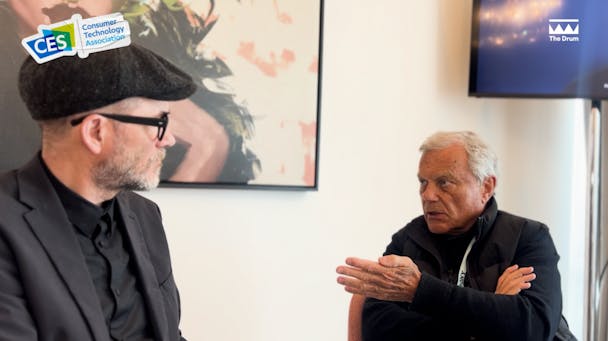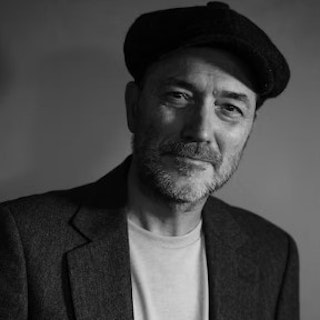‘A maelstrom of uncertainty’: My CES chat with Sorrell became an agency survival guide
Gordon Young, editor-in-chief of The Drum, sat down with S4 Capital’s Sir Martin Sorrell at CES last week to discuss innovation; it ended up as a masterclass in charting a course through a period of disruption.

At CES last week, I had a sit-down chat with Sorrell, the executive chairman of S4 Capital and formerly long-lived CEO of WPP, to weave through the latest gadgets, gizmos, and gimmicks at the festival. You have to hand it to him; at 78, he shows no sign of slowing down. Despite a full schedule that would take him from the Nevada desert to Davos, he was animated in the discussion.
Sorrell did not seem too impressed with the supposed innovations being showcased. “From what I have seen, the show seemed a bit flat this year. I am not sure if the world needs more smart fridges,” he told me. This did reflect the general consensus.
CES, which is celebrating its centenary, very much seemed to be returning to its roots as a B2B trade show for retail buyers - as opposed to the tech wow-fest of recent years. However, one suspects that consumer products have yet to fully harness recent advances in AI. The same cannot be said for the marketing business, which, in Sorrell’s view, is already seeing AI revolutionizing the business, from copywriting, visualization, media buying, and general efficiency to democratizing knowledge.
“The revolution we see is significant already,” he said, “Copywriting and visualization that used to take three weeks can now be done in three hours, thanks to AI. This enables hyper-personalization, producing multiple creative assets instead of just one.”
Contrary to fears of widespread job displacement, Sorrell expressed optimism about the evolving nature of work. He noted that while AI might destroy certain jobs, it would simultaneously create new opportunities, leading to a differently distributed and more globally interconnected workforce. With a focus on shorter timeframes and a changing mindset, he highlighted the potential for enhanced productivity and job quality.
“AI will change jobs, not necessarily destroy them. The balance will be different. It’s about creating a new equilibrium, a differently distributed workforce worldwide. People may have different jobs, but the hours in these models will be much better.”
A specific example is the belief that there is now more logic for clients to bring certain functions - such as production - in-house. But this change is inevitable and one the agency should embrace. With the amount of time it takes to complete the work supposedly changing, there ought to be a knock-on in how the industry is billing clients. “We have to focus more on selling outcomes as opposed to selling time. We do not look at in-housing as the enemy.”
Amid the discussions of AI, geopolitical shifts, and business strategies, Sorrell shed light on why he still loves what he does. He highlighted the dynamic nature of the marketing industry, the challenges it presents, and the intellectual satisfaction derived from grasping people’s emotions and influencing their thinking.
He reflected on what it means to lead in advertising now. “The business is not just about managing complexity; it’s about touching so many different companies, understanding various verticals, and operating with a multi-brand approach. The diversity keeps it interesting and intellectually stimulating.
“It’s an amazing business. You should find a business you enjoy and stick to it. That’s the antithesis of the current thinking of Gen Z, who are now very much flower-to-flower.”
That was a sidebar. Sorrell is one of the few agency leaders whose conversation can seamlessly switch between the future of buying and planning and geopolitics. He has a lot of ground to cover.
At the moment, he is exercised by the Taiwanese elections, a possible Israeli and Saudi Arabian rapprochement and the fact it is a record year for elections. He believes the potential for short-term chaos is preventing leaders from focussing on the long term. “The world is shifting, with a rebalancing of power,” he said. “The uncertainty is driving people to adopt short-term thinking.”
Long-term issues that should be on the radar include the rise of India and Indonesia, which could be included in the top five economies by 2050 alongside China. “The world is becoming more balanced, with the rise of India and the shifting dynamics in Asia. Businesses need to adapt to these changes for sustained growth.”
But of course, societal pressures also add to the uncertainty, and he points out that the remote working phenomena is a disruptive element that cannot be understated. “There is greater fluidity in the workforce than ever.” This is adding to a “maelstrom of uncertainty.”
Sorrell is well aware of the pressures that sudden market change can cause. After performing strongly during the pandemic, S4’s share price has languished, and there have been cuts in the business. However, he does not blame the market or clients. “We have to run the business better and deal with the operational challenges regarding our margins.”
And to conclude, I asked him what tip would he give brand markets to weather the storm if we are living through times of unprecedented change? He is a man who tends to speak in listicles, so he naturally answered in the form of a top three.
“Number one, brands have to remain agile. Two, they must take back control and look at opportunities around in-housing. And three, they have to focus on first-party data. Most brands are not prepared for Google’s plans to phase out the cookie by the end of the year. They are underestimating how much impact that will have.”
Indeed. There is only one constant these days: change.

